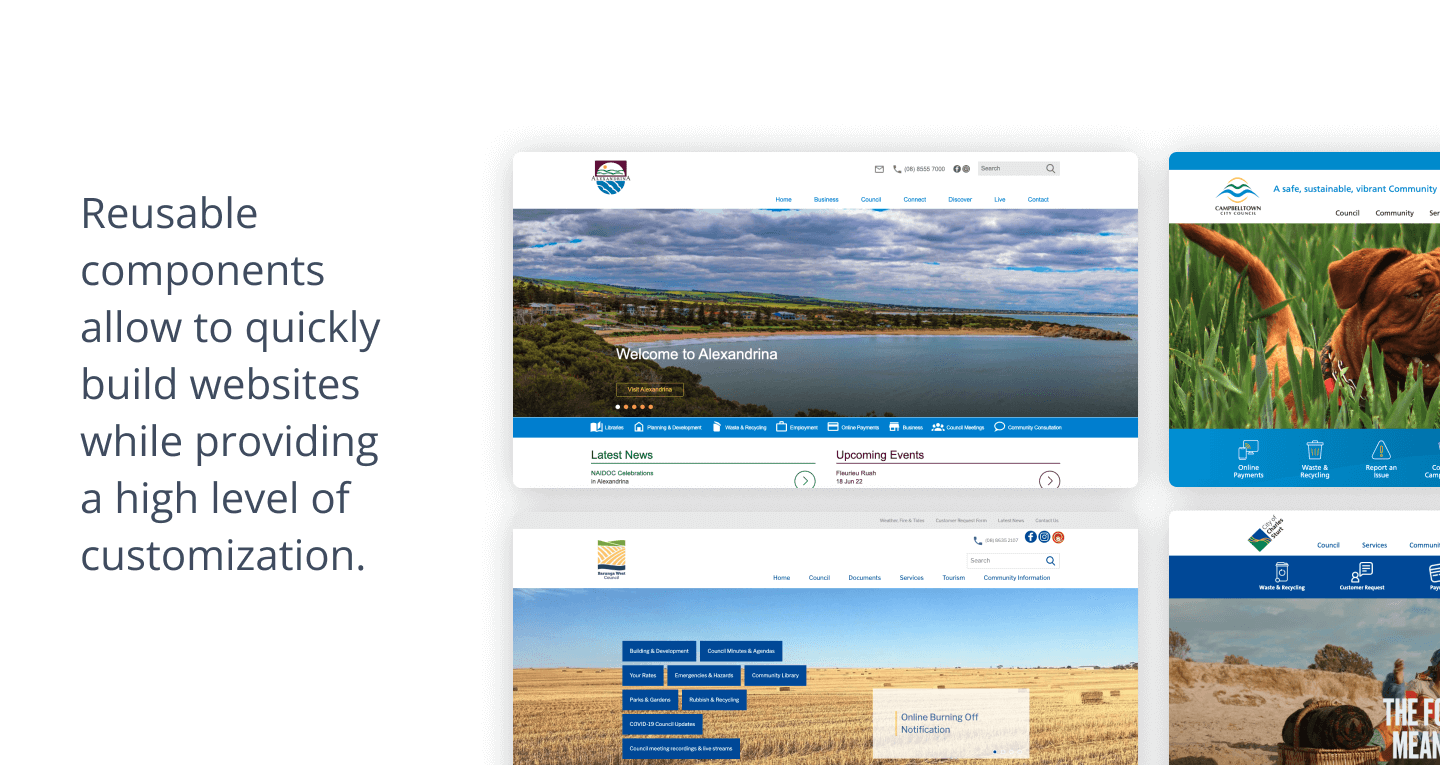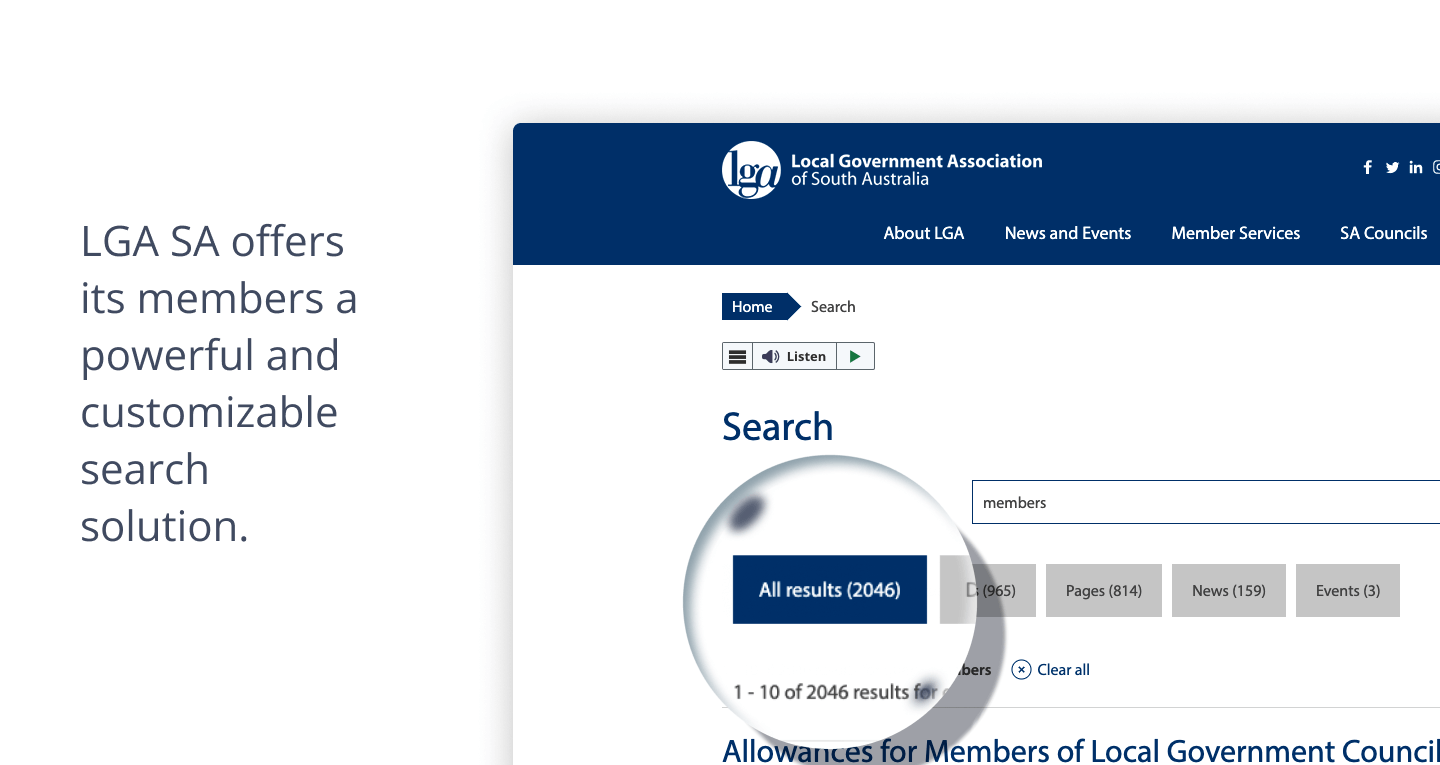LGA SA
With over 130 websites to manage across two states, LGA SA needed a more robust and scalable solution for dynamic content management. Enter the DXP.
The Local Government Association of South Australia (LGA SA) is a busy organization: with over 60 council and local government clients in South Australia and Tasmania, they support and host more than 130 different websites.
When their current CMS reached the end of its lifecycle, the association started to look elsewhere to fulfill its technological needs. The goal was to position itself as a digital agency, capable of undertaking large pieces of development work for its clients, while still offering them the ability to self-serve and deploy their own websites.
In addition to being able to handle a large volume of digital content, the LGA SA was also looking for a solution that could cater to both small and larger organizations, adapting to each of their unique design and content requirement.
End-of-life CMS: now what?
From a more technical perspective, the LGA SA expressed strong interest in reusability and integration features. A shared library of reusable components that each of their clients could use and contribute to, as well as integrations with major databases and payment systems, including My Local Services mobile application data, were seen as non-negotiable requirements.
Finally, the ability to automate content migration and search content across multiple databases scattered among various government bodies were other features that eventually convinced the LGA SA to switch over to Squiz DXP.
Configurable components for all
To best serve its clients, each coming with its individual brand, design and content requirements, the LGA SA needed to build components that could be configured and re-used across the entire Squiz platform.
After an initial discovery phase to gain a better understanding of key user needs and solution requirements, the Squiz team delivered over 40 reusable interface components and templates, which each client site could further enhance and roll out to their own website. Major layout options could be toggled on and off, and clients could easily implement responsive features, drop components in, set layouts via metadata configuration, or refine via CSS.

Squiz also deployed a smart and robust search solution to match each of the client's needs, based on their unique content set and ranking preferences. Search suggestion and query completion features were also warmly received by users.

“Squiz delivered a flexible and robust solution for our councils,” explains John Mundy, Manager Web Solutions at LGA SA.
The LGA Squiz platform provides good value for money and continues to evolve for the benefit of the communities our councils serve.
Improved productivity
Adopting Squiz DXP lead to many gains in productivity and efficiency, not only for the association but also for all their customers.
Using a unique design system across all their websites lead to a 40% improvement in site task completion: web developers no longer need to recreate components that already exist for each new website. User acceptance testing was notably reduced by 80% since all components were already built and pre-assessed.
Accessibility guidelines acceptance also drastically increased by 350%, as components were all WCAG2.0 AA certified.
The result: building a website went from 4 months to a mere 3 weeks, with an average price per website dropping from $30,000 to only $10,000, saving to date over $2m for the government.
Seamless migration
To migrate all the clients’ content from the old CMS to the new solution, a complex content migration project was undertaken, with the development of a metadata mapping script and in-page content web crawlers that achieved a near like-for-like migration and eliminated any manual work.
Each client’s website was eventually fully migrated, configured, and themed within 20 hours each, at a sustainable pace of three to four clients each week.
The seamless migration process helped LGA SA drastically reduce costs, freeing up its staff to focus on higher-value enhancements.